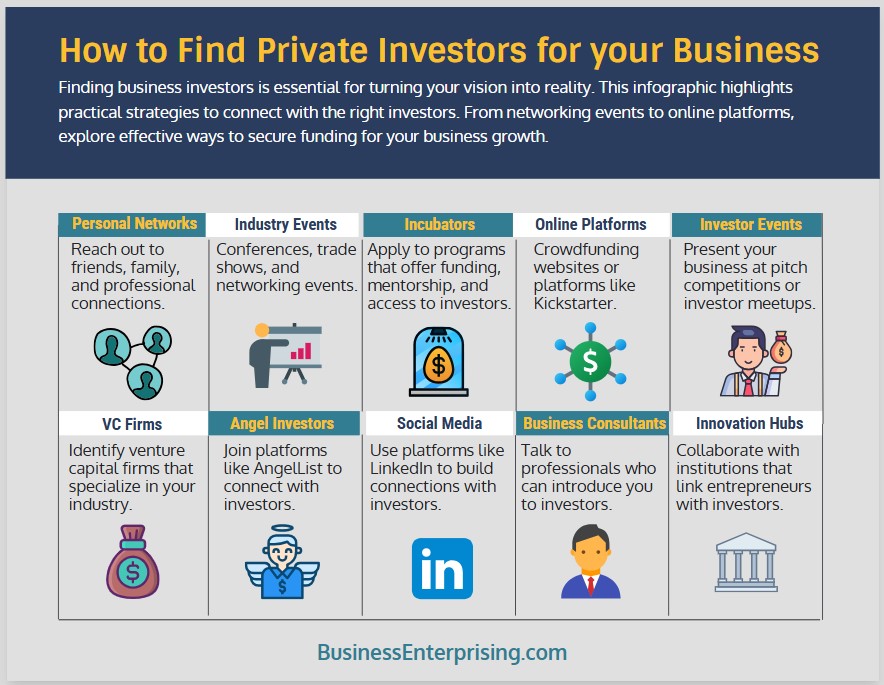 Finding business investors can transform your ideas into reality by providing the funding and support your company needs to grow. However, the process involves more than just pitching your vision. It requires careful planning, strategic networking, and a clear understanding of what different investors seek.
Finding business investors can transform your ideas into reality by providing the funding and support your company needs to grow. However, the process involves more than just pitching your vision. It requires careful planning, strategic networking, and a clear understanding of what different investors seek.
Additionally, preparing for this journey means knowing how to identify the right investors for your goals. By tailoring your pitch and building strong relationships, you create opportunities for successful collaborations. Whether you’re seeking seed funding or growth capital, having the right strategy is essential.
With the right approach, finding business investors becomes a structured and achievable task. By focusing on preparation and aligning your vision with their interests, you increase your chances of success.
Understanding Different Types of Investors
When finding business investors, understanding the types of investors available is essential for securing the right support. Each type of investor offers unique benefits and suits different stages of a business. Knowing their differences can help you choose the best fit for your goals.
Venture capitalists typically invest in startups with high growth potential. They often provide significant funding in exchange for equity and may offer strategic guidance. However, these investors usually seek a strong return within a specific timeframe, which can drive fast-paced growth.
Angel investors are individuals who invest their own money, often in early-stage businesses. They tend to take on higher risks and may provide mentorship. Additionally, angel investors can be more flexible with terms, making them ideal for startups needing seed funding.
Private equity firms focus on established businesses seeking capital for expansion or restructuring. These firms usually invest large amounts and take a hands-on approach. While their involvement can drive efficiency and growth, they often require a controlling interest in the company.
Crowdfunding platforms provide a different avenue by pooling smaller contributions from many backers. This option works well for creative or consumer-focused businesses and helps validate market interest. Furthermore, crowdfunding can double as a marketing tool by building awareness during fundraising.
By understanding these options, you can make informed decisions when finding business investors. Selecting the right type of investor ensures better alignment with your business needs and long-term goals.
Crafting an Effective Pitch
Creating an effective pitch is essential for finding business investors. Your pitch deck should clearly communicate your vision and showcase your business’s potential. A compelling presentation can help you stand out and engage investors effectively.
Start by crafting a pitch deck that highlights key aspects of your business. Include sections on your product, target market, revenue model, and growth strategy. Additionally, use visuals and concise text to make your points clear and memorable. Investors often prefer data-backed insights, so include market research and financial projections.
Tailoring your presentation to your audience is equally important. Different types of investors value different things. For example, venture capitalists may focus on scalability, while angel investors might appreciate passion and innovation. Therefore, research your audience in advance and adjust your messaging to address their priorities.
Your communication style can also make a big difference. Practice presenting confidently and avoid unnecessary jargon. Additionally, be prepared to answer questions about your business model, competition, and long-term plans. This preparation shows you are knowledgeable and serious about your business.
By focusing on these elements, you can create a pitch that resonates with potential investors. A strong pitch not only attracts attention but also builds trust, which is essential for finding business investors who align with your goals.
Identifying Potential Investors
Finding business investors begins with identifying those who align with your industry, business stage, and funding goals. Targeted research helps you focus on investors most likely to be interested in your business. Additionally, understanding their priorities makes your outreach more effective.
Start by analyzing your industry and identifying active investors within it. Industry-specific investors are more likely to understand your market and value your potential. Online databases, industry events, and professional networks are great resources for discovering relevant connections.
Consider the stage of your business when narrowing your search. Some investors focus on early-stage companies, while others prefer established businesses with proven track records. For example, angel investors often support startups, while venture capitalists may seek companies ready for rapid growth. Matching your business stage to their preferences increases the likelihood of engagement.
Additionally, align your funding needs with an investor’s typical range. Research their past investments to understand the scale of projects they support. Tailoring your approach to their history and focus demonstrates your professionalism and preparation.
By carefully identifying potential investors, you can save time and increase your chances of success. Researching their background and aligning your pitch with their interests helps build meaningful connections. This focused strategy is key to effectively finding business investors.
Building Investor Relationships
Building strong investor relationships is an essential part of finding business investors. Networking effectively lays the foundation for meaningful connections. Attending industry events, participating in professional groups, and leveraging social media platforms like LinkedIn can help you meet potential investors. Additionally, introducing yourself with a clear and concise pitch helps make a lasting impression.
Following up after initial meetings is just as important. Send a personalized email or message that references your conversation. This shows you value their time and are serious about building a partnership. Additionally, provide any requested information promptly and address their questions thoroughly. Timely communication builds trust and keeps the relationship moving forward.
Maintaining long-term connections requires consistent engagement. Share updates about your business progress, achievements, or upcoming milestones to keep investors informed. Regular communication demonstrates transparency and shows your commitment to growth. However, focus on providing value in your interactions, whether through insights, gratitude, or collaboration opportunities.
By networking strategically and staying in touch, you can foster relationships that benefit both you and your investors. Building these connections is a key step in finding business investors who align with your vision and can support your goals.
Preparing Financial Documentation
Accurate financial documentation is essential for gaining trust when finding business investors. Investors rely on clear financial statements to assess your business’s stability. Providing detailed records shows your commitment to transparency and builds confidence in your management skills.
Financial forecasts play a critical role in demonstrating your company’s potential. Projections for revenue, expenses, and growth help investors understand your business model and market opportunities. Additionally, well-prepared forecasts allow you to present realistic expectations and identify potential risks.
Valuation metrics are equally important for showing your company’s worth. Calculating metrics such as earnings multiples or discounted cash flow gives investors a clear picture of your value. These metrics also help you justify the investment amount you’re seeking.
Preparing strong financial documentation requires precision and attention to detail. Review your financials thoroughly and seek professional assistance if needed. By presenting accurate and complete documents, you position yourself as a reliable entrepreneur. This approach strengthens your case when finding business investors and increases the likelihood of securing funding.
Navigating Negotiations and Agreements
Negotiating investment agreements is a key step in finding business investors. Clear communication during this process helps establish a mutually beneficial partnership. Additionally, understanding common terms and equity considerations allows you to protect your interests while building trust.
Investment agreements often include terms related to funding amounts, equity distribution, and investor rights. For example, you may encounter terms like voting rights, dividend preferences, or liquidation priorities. By carefully reviewing these clauses, you can ensure the agreement aligns with your long-term business goals.
Equity considerations are another critical element. Deciding how much equity to offer requires balancing investor expectations with maintaining control of your company. Additionally, you should consider future funding needs and the potential dilution of shares over time. Discussing these factors openly with investors fosters transparency and minimizes conflicts.
A win-win partnership depends on aligning goals and expectations. Therefore, take the time to understand your investor’s priorities and share your vision clearly. Drafting agreements that reflect shared objectives strengthens the foundation of the relationship. This collaborative approach not only secures funding but also ensures ongoing support.
By navigating negotiations thoughtfully, you can create agreements that benefit both parties. This process is an essential part of successfully finding business investors and building lasting collaborations.
Conclusion
Finding business investors is a critical step in growing your company and achieving your goals. By understanding investor types, preparing strong financial documentation, and crafting an effective pitch, you can increase your chances of success. Additionally, building long-term relationships and negotiating fair agreements ensure a strong foundation for collaboration.
However, the process requires research, preparation, and clear communication. Taking the time to align your business needs with investor expectations creates a win-win partnership. Additionally, maintaining transparency and professionalism throughout fosters trust and sets the stage for future opportunities.
By approaching each step strategically, you can navigate the challenges of finding business investors with confidence. This thoughtful approach not only secures funding but also builds lasting partnerships that support your business’s growth.



